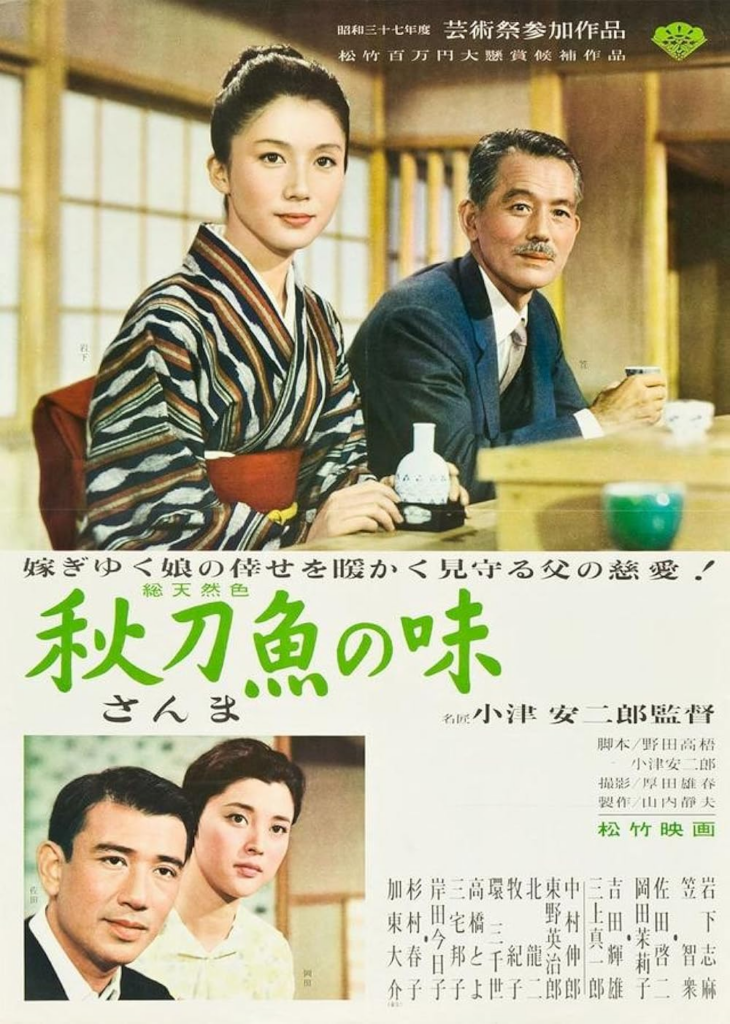
AN AUTUMN AFTERNOON (SAMMA MA NO AJI)
(director/writer: Yasujiro Ozu; screenwriter: Kôgo Noda; cinematographer: Yûshun Atsuta; editor: Yoshiyasu Hamamura; music: Kojun Saitô; cast: (Shuhei Hirayama), Shima Iwashita (Michiko Hirayama), Kyôko Kishida (The bar hostess), Nobuo Nakamura (Kawai), Shinichirô Mikami (Kazuo Hirayama), Keiji Sada (Koichi Hirayama), Mariko Okada (Akiko), Teruo Yoshida (Miura), Eijirô Tono (Sakuma, The ‘Gourd’), Haruko Sugimura (Tomoko, Sakuma’s daughter), Ryuji Kita (Professor Horie); Runtime: 112; MPAA Rating: NR; producer: Shizuo Yamanouchi; New Yorker Films; 1962-Japan, in Japanese with English subtitles)
“This is what a masterpiece looks like.“
Reviewed by Dennis Schwartz
This simple old-fashioned family drama (Yasujiro Ozu’s simplest–there’s a static camera–and most assured film yet) set in an industrialized and increasingly westernized postwar Tokyo was the swan song for the great director–maybe the best there ever was; it’s one of the few he shot in color. The Japanese title Samma Ma No Aji literally translates to The Taste of Mackeral. That title suggests the film’s melancholy and mellow mood. It was filmed when his beloved 87-year-old mother, whom the bachelor still lived with, passed away. In his diary, the then 59-year-old Ozu (he was to die the next year) jotted down the following poem after her funeral:
“Down in the valley it is already springClouds of cherry blossoms;But here, the sluggish eye, the taste of mackeral–The blossoms are melancholyAnd the flavor of sake becomes bitter.”
Its gentle, nostalgic narrative is very much like A Story of Floating Weeds, Floating Weeds, Late Spring and Late Autumn. The actors are mostly the same ensemble cast Ozu used throughout his long career. The theme revolves around an old man’s loneliness and adjusting to a changing world which is losing some of its better traditions from the so-called glorious past (such as a meltdown of the nuclear family). The hero is the kindly aging widower Shuhei Hirayama (Chishu Ryu), who is a company auditor living with his self-sacrificing 24-year-old daughter Michiko (Shima Iwashita) and his youngest twentysomething spoiled son Kazuo (Shinichirô Mikami). His eldest child is the married Koichi (Keiji Sada), who earns a small salary but loves to spend money on consumer goods he can’t afford as we witness him buying golf clubs and then hitting dad up with money to buy a refrigerator.
Hirayama learns that one of the secretaries in his firm, the same age as his daughter, has gotten married. His closest long-time friend Kawai (Nobuo Nakamura) urges him to allow Michiko to marry before it’s too late and tells him about a 29-year-old medical assistant who would be a suitable match. Hirayama is not sure if his daughter is ready for marriage, or for that matter if he’s willing to lose her, and delays mentioning this offer to her. But Hirayama has a change of heart when holding a class reunion and getting drunk. By accident Hirayama ran into the group’s school teacher, Sakuma (Eijirô Tono), nicknamed “The Gourd,” who has fallen into bad times and runs a dumpy noodle shop in the neighborhood. They haven’t seen each other for forty years, and the more prosperous students feel sorry for their saddened widow teacher. When Hirayama takes the drunken teacher home and meets his now unappealing aging spinster daughter, Tomoko (Haruko Sugimura), he vows that it’s time for his daughter to marry so she won’t have the same disappointing fate. He’s surprised when Michiko infers she loves Miura (Teruo Yoshida), who works in the same firm as her older brother. Upon his father’s request, Koichi meets with his friend and discovers he was interested in Michiko but when told she wasn’t ready for marriage got engaged to another girl. Both older brother and father feel guilty and apologize to Michiko, who after crying in private agrees to the arranged marriage and looks radiant on her wedding day. It concludes on the late autumn afternoon of Michiko’s wedding day, as Hirayama drinks with his friends Kawai and Professor Horie (Ryuji Kita) at their favorite bar and then goes off alone to another bar, where the 29-year-old barmaid reminds the sad man (but not his oldest son) of his wife. After listening to a war march that is playfully acted out by the bar patrons as it stirs up patriotic pride, reminding Hirayama about when he served during the war as a captain of a ship, Hirayama returns home resigned to the fact his daughter is gone and that he’ll have to face things on his own. He puts on a good face thinking that this personal loss can be compared to his country’s war loss, and convinces himself that maybe both weren’t the worst things that could have happened–that change is inevitable and must be faced.
It’s elegant, well-acted, sublime, philosophical, haunting and memorable. This is what a masterpiece looks like.
REVIEWED ON 3/17/2006 GRADE: A+
© ALL RIGHTS RESERVED DENNIS SCHWARTZ